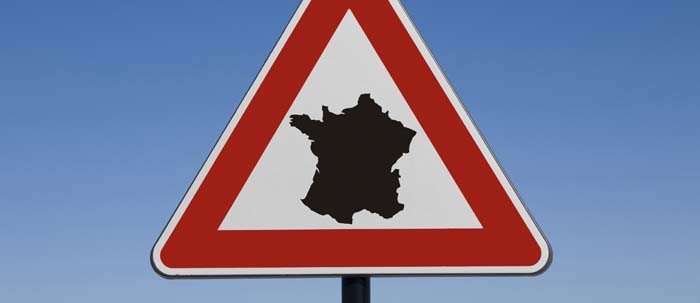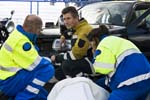Spotlight on Europe. European transport laws and local regulations.
Many moving companies travel regularly to Europe and, therefore, need to keep up to date with European transport laws and local regulations. Here are the recent developments courtesy of FEDEMAC.
FRANCE

Breathalyser Kits
Remember that from 1 July, 2012, all drivers of any motor vehicle, excluding mopeds, will need to carry an unused breathalyser kit if driving in France. Enforcement of a euro 11 fine for non-compliance will start on 1 November, 2012. The breathalyser kit must meet certain conditions, notably the expiration date set by the manufacturer. 11 euros won’t break the bank just yet but rumour has it the fines will go up later.
Authorities will not ask drivers to use their own breathalyser kit to test their blood alcohol level. Should a driver be required to submit to a blood alcohol test, authorities will use their own.
France will allow the circulation of 44T trucks on the national network from 1 January, 2013
On 7 March, 2012, the French Ministry of Transport published a press release regarding the conditions for allowing the circulation of 44T HGVs on the national road network. By fixing the authorised weight for HGVs at 44T (as is the case in some other EU Member States), this measure aims to strengthen the competitiveness of the road haulage sector (by reducing the fuel consumption and the CO2 emissions). The implementation of the authorisation will come into force from 1 January, 2013.
 GERMANY
GERMANY
Long term road works – Cologne, A1
Important road works on the Cologne A1 ring road in Germany started on 16 April, 2012, and will last until the end of 2012.
Low Emission Zone changes and updates
Cologne has confirmed it’s extending its LEZ area from 1 April, 2012, and tightening the emissions standards from 1 January, 2013, to 1 July, 2014. Erfurt announced an LEZ to start on 1 October, 2012, with a Euro 4(PM) standard. Wiesbaden announced an LEZ to start in December 2012 with a Euro 4(PM) standard
LATVIA
Paternieki-Grigorovschina border checkpoint suspended
Due to the building works at Grigorovschina customs checkpoint (Belarus), truck traffic through the Paternieki-Grigorovschina checkpoint on the Latvian-Belarusian border has been suspended from 15 March until 15 October, 2012. It is recommended that international cargo truck traffic is redirected to border-crossing points: Silene-Urbany (Latvia-Belarus) and Burachki-Terekhovo-Burachki (Latvia-Russia) and other checkpoints. Long delays have been reported at the Silene-Urbany border-crossing point.
 ITALY
ITALY
Milan - Congestion charge
A court in Milan has rejected five legal attempts to suspend the city’s congestion charge area that came into force in January. The administrative court said it had a need to balance the public and private interests at stake, but said the public interest in health and environment protection was more important than the interests of private motorists, and that the congestion charge was reasonable.
 PORTUGAL
PORTUGAL
Low Emission Zone Changes/Update
On 1 April, 2012, Lisbon’s LEZ was tightened and extended to Euro 2 in the inner area and Euro 1 in the outer area.
 EU Strategy to reduce road traffic injuries
EU Strategy to reduce road traffic injuries
Road safety strategies traditionally focus on reducing fatalities. Injuries have however become a major health problem and, in 2010, about 1,500,000 people were injured on the roads of the European Union. The European Commission is developing a comprehensive strategy of action concerning road traffic injuries and emergency services and hopes to find a common understanding of definitions and concepts relating to casualties (in particular, the definition of serious and slight injuries), improve data collection and identify courses of action to improve prevention and intervention, including their socio-economic impact.
EuroFOT: Intelligent vehicles to the road
The European Field Operation Test of active safety systems (EuroFOT) will soon reveal the results of its first large-scale operational test. A thousand vehicles and trucks were equipped with safety and fuel efficiency features for 12 months during which large amounts of data was collected. Some preliminary results have already been provided based on a questionnaire that was filled out by the drivers three times during the period of 12 months. The results of the questionnaires provided two major observations: firstly, that driver behaviour changed in the course of the test since 70% of those who did not believe the systems to be helpful in the beginning of the test thought the opposite in the end of the test period. Secondly, the added value of the systems were noticed to reach beyond road safety, for example they had the impact of remarkably reducing fuel consumption.
Revised tachograph legislation in the first parliamentary reading
The European Commission proposal for the new tachograph legislation aims to make fraud more difficult, to better enforce social rules applicable to road transport and to reduce the administrative burden by using a range of new technologies and regulatory measures.
TRACE project
The aim of the TRACE project is to develop a harmonised training format for enforcers on the Drivers' Hours' Rules Regulation. This goal will be achieved through the development of harmonised training modules for officers responsible for monitoring the social legislation relating to road transport in Europe. The project is funded by the European Commission and it will be lead by VOSA. The project is now reaching its final stage with an official end set for August 2012.
EC demands all truckers comply with Working Time Directive
The European Commission (EC) has called on Austria, the Czech Republic, Finland, France, Poland, Portugal and Spain “to take appropriate measures” to apply the Working Time Directive to self-employed road hauliers. The EC warned: “If these Member States fail to inform the commission within two months about the measures taken to ensure compliance with EU law in this respect, the commission could refer the cases to the European Court of Justice.”
“e-CMR” needed to further increase efficiency of road transport
The International Road Transport Union (IRU) has welcomed the entry into force of the Additional Protocol to the CMR Convention, which transitions from the current slow and unreliable paper-based system, to faster and more efficient electronic Consignment Notes (e-CMR) and has called upon governments to join the Additional Protocol and adopt a harmonised approach to its implementation. It also says that governments should agree on technical standards regarding electronic signatures and authentication methods in order to experience the full benefits of e-CMR. At present, e-CMR can only be used in seven countries - Bulgaria, Czech Republic, Latvia, Lithuania, Netherlands, Spain and.
IRU calls on the European Union to lift road transport barriers
The IRU General Assembly has adopted a Resolution on ‘Driving the Europe 2020 Growth Strategy’ calling upon the European Union and its Member States to lift, without delay, the impediments and barriers imposed on the road transport sector and to recognise the vital role of road transport in driving economic growth.
Europe agrees core transport plan
A euro 31.7 billion EU plan to streamline and integrate Europe’s segmented and rattling transport network into a cohesive whole was agreed by EU transport ministers in Brussels in March 2012. Debate can now start over the most difficult issue: funding. Siim Kallas, European Commissioner for Transport, said that although crunch discussions on financing lay ahead, the deal was “a very important achievement” that would start to move Europe away from a patchwork of national networks towards a pan-European hub.
Road interests launch ‘Green Freight’ initiative
Estimates of today’s fuel efficiency of lorries vary widely. Existing data measuring emissions from lorries give a very varied picture. An alliance of road freight interests has therefore launched ‘Green Freight Europe’, aimed at working out a reliable method of measuring emissions from lorries. The improved system being trialled will be monitored by an independent energy trust.